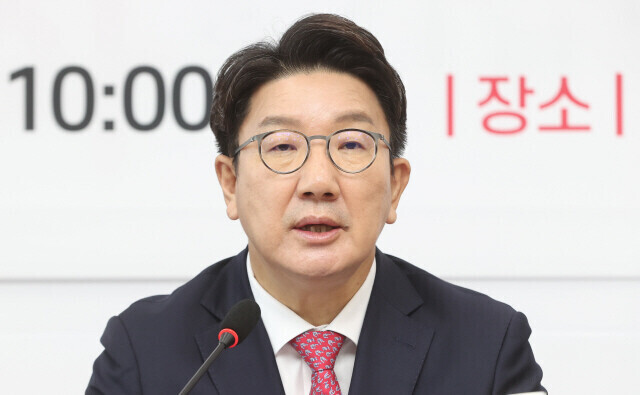hankyoreh
Links to other country sites 다른 나라 사이트 링크
PPP, justice minister hint at disenfranchising foreign residents in Korea

As South Korea-China relations continue to sour over the Chinese ambassador to Korea’s remarks about “betting on China’s defeat” and the critical response from South Korean President Yoon Suk-yeol, controversy is now growing over moves by the presidential office, ruling People Power Party (PPP), and administration to restrict voting rights for Chinese nationals and other foreign residents of South Korea.
In a post on his Facebook page on Wednesday, PPP lawmaker Kweon Seong-dong wrote, “South Korean nationals have no voting rights in China. Many countries grant voting rights only to those with citizenship, and it is rare to see cases where voting rights are extended to permanent residents.”
Kweon also called for passage of an amendment to the Public Official Election Act, which he was a chief sponsor for last December. This amendment would grant the right to vote in local elections to foreign nationals from countries that allow voting rights to South Korean nationals, provided that those residents have lived in South Korea for at least five years.
“I absolutely cannot agree with those who characterize discussions on an election law amendment based on a principle of reciprocity as being a form of ‘hate,’” he wrote.
Since 2005, South Korea has granted local election voting rights to foreign nations who acquired permanent residency at least three years earlier. In another Facebook post last Monday, Kweon noted, “Around 100,000 Chinese nationals currently have the right to vote in [South Korean] local elections.”
“China has a practical means of interfering with the Republic of Korea’s internal administration,” he argued.
The presidential office and administration have also shown signs of moving to restrict the voting rights of Chinese nationals.
Meeting with reporters at the National Assembly on Wednesday, Minister of Justice Han Dong-hoon said, “I believe we should put in place a permanent residency and voting law system that conforms to a global standard, and part of that includes examining regulations on permanent residency rights.”
“This is not about selecting specific countries,” he insisted.
Han’s remarks bore some connection to directions handed down by Yoon. While making critical remarks about Ambassador Xing Haiming of China during a Cabinet meeting the day before, Yoon had demanded “efforts to improve systems to suit the principle of reciprocity” between South Korea and China.
According to National Assembly Budget Office figures, a total of 126,668 foreign nationals had voting rights in South Korea as of late March 2022. The majority of them were Chinese nationals, who accounted for 78.9% (99,969).
This explains why some observers are characterizing the talk about “voting rights reciprocity” by the presidential office, administration and PPP as amounting to a push to discriminate against and exclude Chinese nationals living in South Korea.
“The advanced democracies in Europe grant local election voting rights to foreign nationals in the interest of guaranteeing resident autonomy, and South Korea had been following that trend too,” said Lee Kwan-hu, a professor at Konkuk University’s Sang-Huh College.
“There doesn’t seem to be any cause for using the Chinese example [of not guaranteeing voting rights for South Korean nationals] as an excuse to roll back the level of our democracy,” he stressed.
By Sun Dam-eun, staff reporter
Please direct questions or comments to [english@hani.co.kr]

Editorial・opinion
![[Column] Tariffs on China: Trump was dumb, Biden dumber [Column] Tariffs on China: Trump was dumb, Biden dumber](https://flexible.img.hani.co.kr/flexible/normal/500/300/imgdb/original/2024/0520/191716191153918.jpg) [Column] Tariffs on China: Trump was dumb, Biden dumber
[Column] Tariffs on China: Trump was dumb, Biden dumber![[Column] What if Seoul took reunification by force off the table? [Column] What if Seoul took reunification by force off the table?](https://flexible.img.hani.co.kr/flexible/normal/500/300/imgdb/original/2024/0520/3017161928630494.jpg) [Column] What if Seoul took reunification by force off the table?
[Column] What if Seoul took reunification by force off the table?- [Editorial] Intensifying US-China rivalry means Seoul must address uncertainty with Beijing sooner than later
- [Column] When ‘fairness’ means hate and violence
- [Editorial] Yoon must stop abusing authority to shield himself from investigation
- [Column] US troop withdrawal from Korea could be the Acheson Line all over
- [Column] How to win back readers who’ve turned to YouTube for news
- [Column] Welcome to the president’s pity party
- [Editorial] Korea must respond firmly to Japan’s attempt to usurp Line
- [Editorial] Transfers of prosecutors investigating Korea’s first lady send chilling message
Most viewed articles
- 1Xi, Putin ‘oppose acts of military intimidation’ against N. Korea by US in joint statement
- 2For new generation of Chinese artists, discontent is disobedience
- 3Kim Jong-un wanted to meet with residents of shelled Yeonpyeong Island in South, Moon recalls in mem
- 4To weigh costs and benefits, Korea must stop treating US troop presence as a sacred cow
- 5[Column] What if Seoul took reunification by force off the table?
- 6[Exclusive] Unearthed memo suggests Gwangju Uprising missing may have been cremated
- 7[Editorial] Transfers of prosecutors investigating Korea’s first lady send chilling message
- 8[Editorial] Intensifying US-China rivalry means Seoul must address uncertainty with Beijing sooner t
- 9Berlin mayor hints at tearing down ‘comfort women’ memorial in city
- 10How K-pop broke the internet — and broke into the US market